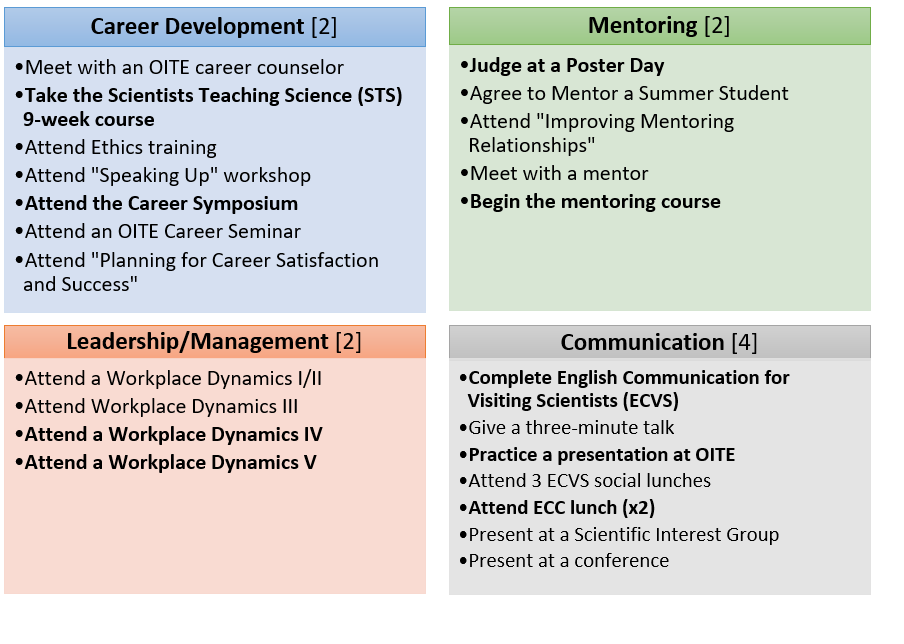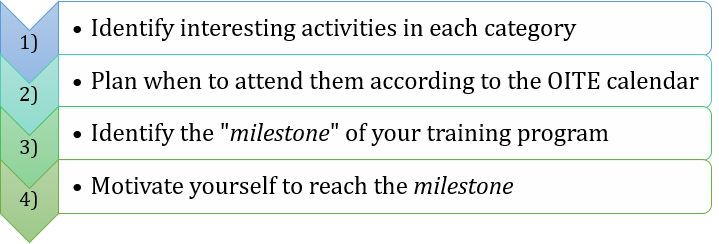Making the Most of Your Experience at NIH: The Scorecard
I arrived at NIH in October 2015. I attended the workshop “English Communication for Visiting Scientists” (ECVS) workshop in February 2016 because, as non-native speaker, I wanted to improve my communication skills. I remember that I was afraid of asking my PI to sign the written consent I needed to register for it. I soon realized how unwarranted my fear was! My PI was glad to know that I wished to improve my communication skills. This has been the first lesson I learned from The Scorecard: “If you don’t ask, the answer will always be no.”
The ECVS workshop. The 2-day workshop itself was very useful. I learned and practiced how to write professional e-mails and to be assertive. But most importantly, I realized that I was not alone. Instead, I was surrounded by people who understood the fear and the frustration of jumping suddenly into a completely different world. During the ECVS workshop, I learned about the Scorecard: an intensive training program to be completed within 6-months. The program (Fig. 1) envisages 10 scores earned by completing the workshops/activities. They are grouped into four categories: career development, mentoring, leadership/management, and communication.

Fig. 1. Representation of the Scorecard categories. Numbers in squared brackets represent the points needed to complete each category. The activities I included in my scorecard are in bold.
The Action Plan. I am a person who likes challenges, so I decided to try and draft an action plan (Fig. 2). First, I identified among the listed courses/activities the ones I was most interested in. Then, I looked at the Office of Intramural Training and Education (OITE) calendar, planned when to attend them, to ensure that I was able to meet the deadline. Last but not least, I identified what I call the “milestone” of my program, i.e. the most difficult and time intensive course. In my case, it was the “Scientists Teaching Science (STS) 9-week course”. I knew that completing it would have motivated me to keep following the plan. Among the other activities that I included in my plan, I chose to attend the Workplace Dynamics IV and V workshops and the mentoring course, and to give a presentation at OITE. I will briefly describe them in the next paragraphs by highlighting why I think they have been very useful for me.

Fig. 2. My “action plan” to complete the Scorecard.
Career development. The milestone of my program - the STS 9-week course - is, in my opinion, a must for fellows aiming at an academic career. One of the assignments is to write the teaching philosophy statement, a fundamental piece of the academic job package! Having the opportunity to have a person with a long-term experience in education, read it and provide constructive feedback is priceless. Moreover, the course is entirely on-line and the teacher provides students with useful hints on how to organize on-line courses and incorporate active learning techniques in the classes. I simply loved it.
Leadership/Management. The Workplace Dynamics series opened my mind. At the beginning of the workshop, as soon as I realized that I had to practice by speaking to the person close to me, I wanted to run away! Yes, I am an extremely introverted person. I am afraid of talking to people, especially in a language that is not my mother tongue, and I prefer to write e-mails. E-mails that most of my colleagues never read, because they prefer to communicate verbally. It took me a while to realize that my approach was ineffective. The workshops provided me with helpful hints on how to address the differences in the personalities and communication styles between me and my colleagues that and made me more successful at work. After attending the two workshops I needed for the scorecard, I decided to complete the series and I am going to attend the next Management Boot Camp.
Mentoring. The “Summer Research Mentor Training course” was another very helpful workshop. Similar to the STS course, one of the assignments was to write the mentoring philosophy statement. I have recently used both assignments as drafts for an application for an academic position. During the course, I learned the importance of aligning mentor/mentee goals and expectations and assessing differences in communication and learning styles. We all tend to communicate and teach the way it is most effective to us. Recognizing that what works for us does not necessarily work for other people and learn how to manage those differences is the first step to become an effective mentor. I look forward to have the opportunity to mentor a summer student.
Communication. As an introverted, not native speaker, presentations were a huge obstacle for me. I love to design and sketch them out but, until several months ago, I would have paid someone else to deliver them in my place. Most importantly, I would never have volunteered for a presentation. I now realize that my fear to present caused me to miss many valuable opportunities to practice! Now things have changed. Taking part in the activities suggested by the scorecard helped me to practice and build my confidence. I now look forward to presentations rather than trying to avoid them. The author of a book entitled “The Exceptional Presenter” states: “The time to practice is during your normal daily routines, when habits can be formed and mistakes are not costly.”
Final thoughts. All that said, the Scorecard simply acted as “firestarter”. The goal of earning a training certificate motivated me to engage in the program and meeting the deadlines helped me to stay on track. However, as soon as I realized how useful the program was, I attended many other courses beyond the Scorecard. When I earned the ECVS certificate, however, I was really surprised to know that nobody else completed the scorecard before me. So, I decided to write this post to encourage other fellows to engage in it.
Please fellows, don’t think you don’t have the time and don’t be a “rat in the lab”! Please bear in mind that the knowledge you will gain by completing the Scorecard training program will help you feel better in your lab, communicate more effectively with your PI and colleagues, and develop your career. And please, please don’t miss any opportunity to practice your communication skills!
So, what are you waiting for? The next ECVS workshop is on March 1st, don’t miss it!
****
This post was written by guest blogger, Dr. Antonella Ciancetta, Visiting Fellow at the National Institute of Diabetes and Digestive and Kidney Diseases and first fellow who earned the English Communication for Visiting Scientists Certificate

